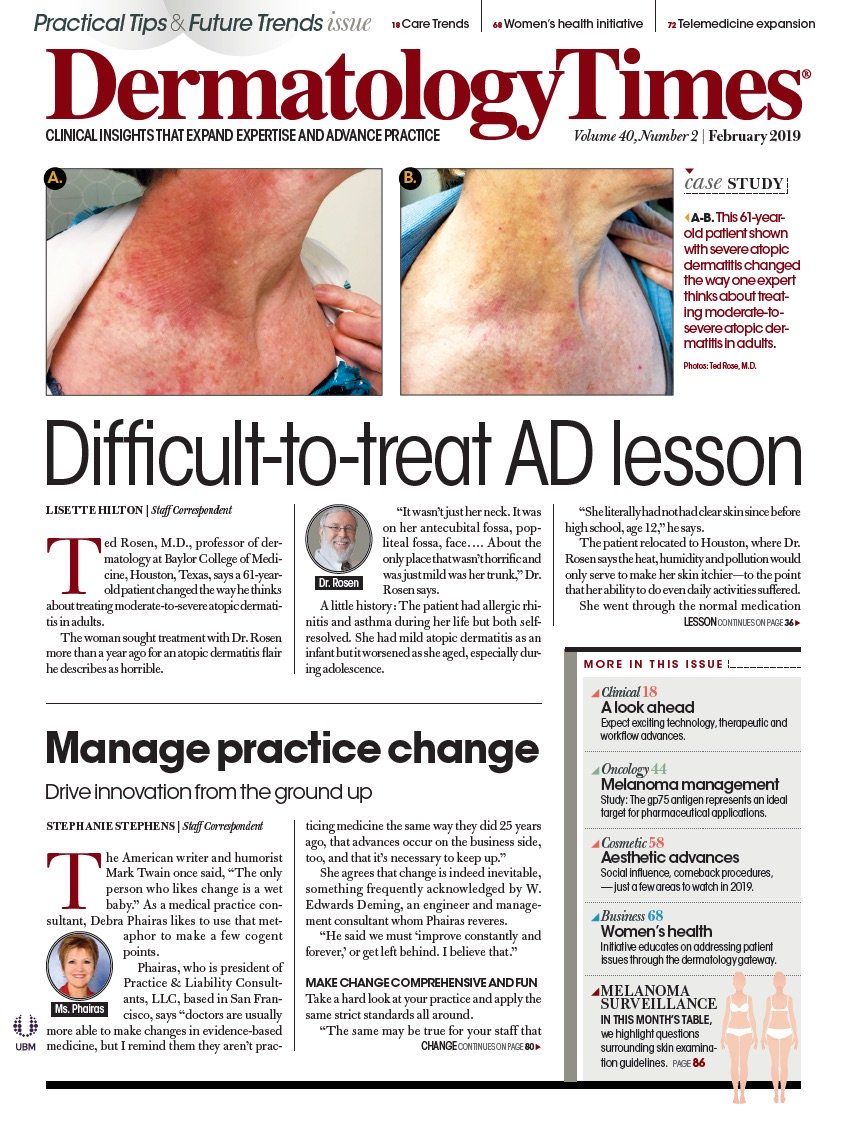- Case-Based Roundtable
- General Dermatology
- Eczema
- Chronic Hand Eczema
- Alopecia
- Aesthetics
- Vitiligo
- COVID-19
- Actinic Keratosis
- Precision Medicine and Biologics
- Rare Disease
- Wound Care
- Rosacea
- Psoriasis
- Psoriatic Arthritis
- Atopic Dermatitis
- Melasma
- NP and PA
- Skin Cancer
- Hidradenitis Suppurativa
- Drug Watch
- Pigmentary Disorders
- Acne
- Pediatric Dermatology
- Practice Management
- Prurigo Nodularis
- Buy-and-Bill
Publication
Article
Dermatology Times
Initiative uses dermatology to address total women’s health
Author(s):
Dermatology care for women goes beyond skin. Practicing dermatologists reside at the crux of meeting women’s needs and play an important role in addressing issues like aging, self-esteem, hormones and stress management.
Dermatology care for women goes beyond skin. Practicing dermatologists reside at the crux of meeting women’s needs, said Pearl Grimes, M.D., president of Women’s Dermatologic Society (WDS).
“We play a role in addressing issues, such as aging, self-esteem, hormones, and stress management. We look at all of these things, but it comes through dermatology,” she said. “We’re such integral players in the house of medicine. As part of that total health team, we particularly look at the total health of women.”
WDS launched an initiative this spring to help fulfill this responsibility. The program, known as Total Women’s Health Through the Dermatology Gateway, offers providers the education and tools necessary to be maximize their critical patient care responsibilities.
To help both male and female dermatologists reach this goal with their female patients, the Gateway includes educational support, community intervention, and industry research leadership possibilities through the International Journal of Women’s Dermatology.
According to Jenny Murase, the Journal’s co-editor-in-chief, the Gateway initiative presents the opportunity for dermatologists to make a long-term impact on women’s health.
“Skin, hair, and nails are critical elements under the Total Women’s Health umbrella, and we need dermatologists at the table to represent these important facets of health during a woman’s journey, ranging from childhood, adolescence, child-bearing years, and including episodes of pregnancy, breastfeeding, and menopause,” she said.
MULTI-DISCIPLINARY EDUCATIONAL OPPORTUNITIES
Before the Gateway, Dr. Grimes said, WDS had never offered any continuing medical education (CME) opportunities. The first event is scheduled for February 2019 and will offer traditional leadership and mentoring programs. However, it will also include sessions and discussions with women physicians from other specialties, including cardiology, gynecology, psychiatry, and others.
“These women will spend the morning talking about the total women’s health issues we see and address in our patients through the dermatology gateway via discussions with our patients and referrals,” she said.
More dermatology-specific topics, such as skin cancer management, latest developments in alopecia, and atopic dermatitis, will fill the afternoon.
Ultimately, she said, she hopes the CME event will impress upon dermatologists that, in many ways, they are part of the first line of defense when it comes to fulfilling a patient’s health needs.
“It’s about addressing the needs of the total woman rather that just her skin care needs,” Dr. Grimes said. “We don’t expect dermatologists to be cardiologists or psychiatrists, but they need to get a sense of where she is and let her know you’re an integral player on her team.”
To continue this work, she said, the WDS will apply for grants that will support their quest for a greater volume of evidence-based data on women’s health issues and how they can be met through the Gateway.
REACHING THE COMMUNITY
Not every woman has easy access to dermatology services, Dr. Grimes said. To help meet their needs, dermatologists participating in the Gateway initiative are already taking their services to women’s shelters. Currently, there are two women’s shelter programs operating - one in Los Angeles and one in Lafayette, La., but WDS plans to open between 10 and 13 programs within a year.
“Every component of this program is geared toward building self-esteem in women in shelters so when they re-emerge into the real world, they’re re-emerging with a much stronger sense-of-self, self-esteem, and empowerment,” she said.
During these Saturday sessions, dermatologists offer guidance about skin care-on-a-budget, nutrition-on-a-budget, social skills and etiquette training. For example, women learn about quality cleansers and moisturizers available for less than $10, as well as the importance of sunscreen for preventing skin cancer and Vitamin D supplements for women of color.
Additionally, she said, these sessions provide information about good nutrition to improve overall health. The dermatologists leading the groups pass out healthy meal planning brochures and discuss how genetically-modified foods, high- and low-glycemic index foods, healthy snacks, and how to avoid toxins present in canned foods.
RESEARCH LEADERSHIP
Although in-office and community interactions are important, passing along evidence-based research about the role and impact of dermatologists in women’s health is also vital, Dr. Grimes said. Consequently, the Journal has augmented the topics it will cover in two sections.
“We developed the Women’s Health Highlight and the Patient Pages to highlight topics that have broad appeal for the general population,” the Journal’s Murase said.
The Women’s Health article will be the first article every month and will address subjects that touch both dermatology and other specialties. They will be either reports, evidence-based reviews, studies, or opinions pieces. Subjects will cover a wide gamut with two of the first articles focusing on cosmetic procedures safe during pregnancy and vaginal rejuvenation.
According to Murase, the Patient Pages will be printable information that dermatologists can use to prompt their patients to ask relevant questions and begin dialogues.
Ultimately, Dr. Grimes said, she hopes the Gateway initiatives breathe new life into how dermatologists approach caring for their female patients.
“Our hope is that women dermatologists will understand the need and importance of addressing the total issues that women face in their overall health,” she said. “It’s about counseling and about getting women the appropriate referrals. The take-home message is that you can’t have tunnel vision. You have to view the patient - and taking care of their skin - as being part of whole health.” Â







